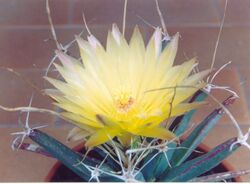Biology:Cacteae
| Cacteae | |
|---|---|

| |
| Leuchtenbergia principis flower | |
| Scientific classification | |
| Kingdom: | Plantae |
| Clade: | Tracheophytes |
| Clade: | Angiosperms |
| Clade: | Eudicots |
| Order: | Caryophyllales |
| Family: | Cactaceae |
| Subfamily: | Cactoideae |
| Tribe: | Cacteae Rchb. |
| Type genus | |
| Mammillaria | |
Cacteae is a tribe of plants of the family Cactaceae found mainly in North America especially Mexico.[1] As of August 2018[update], the internal classification of the family Cactaceae remained uncertain and subject to change. A classification incorporating many of the insights from the molecular studies was produced by Nyffeler and Eggli in 2010.[2]
Description
The spherical to short columnar plants grow individually or in cushions. Their size varies from dwarf (Turbinicarpus) to huge (Ferocactus). The non-segmented shoot axis is ribbed (Echinocactus), warty (Coryphantha) or ribbed-warty. The size and shape of the warts ranges from long and leafy (Leuchtenbergia) to broad with flat axillae (Turbinicarpus). The areoles are usually oval, ribbon-like, grooved, or dimorphic. The small to medium-sized, regular to rarely bilaterally symmetrical flowers appear below the crown and open during the day. The fruits are fleshy to juicy berry-like, with a scaly to glabrous pericarp. They are bursting to non-bursting or simply crumbling. The small to large seeds vary in shape and surface structure of the seed coat.
Genera
The classification of cacti is in flux; the following list of genera is that from Nyffeler and Eggli (2010).[2]
- Acharagma
- Ariocarpus
- Astrophytum
- Aztekium
- Cochemiea has been split off since Nyffeler and Eggli (2010)[3]
- Coryphantha
- Digitostigma
- Echinocactus
- Echinomastus
- Epithelantha
- Ferocactus
- Geohintonia
- Kadenicarpus
- Kroenleinia
- Leuchtenbergia
- Lophophora
- Mammillaria –
- Mammilloydia
- Obregonia
- Pediocactus
- Pelecyphora
- Sclerocactus
- Stenocactus
- Strombocactus
- Thelocactus
- Turbinicarpus – Kadenicarpus and Rapicactus have been split off since Nyffeler and Eggli (2010).[4]
The type genus is Mammillaria.
References
- ↑ Arthur C. Gibson; Park S. Nobel (11 October 1990). The Cactus Primer. Harvard University Press. p. 253. ISBN 9780674089914. https://books.google.com/books?id=B1NEgtRguQMC&pg=PA253.
- ↑ 2.0 2.1 Nyffeler, R.; Eggli, U. (2010). "A farewell to dated ideas and concepts: molecular phylogenetics and a revised suprageneric classification of the family Cactaceae". Schumannia 6: 109–149. doi:10.5167/uzh-43285.
- ↑ Breslin, Peter B.; Wojciechowski, Martin F.; Majure, Lucas C. (2021), "Molecular phylogeny of the Mammilloid clade (Cactaceae) resolves the monophyly of Mammillaria", Taxon 70 (2): 308–323, doi:10.1002/tax.12451
- ↑ Vázquez-sánchez, Monserrat; Sánchez, Daniel; Terrazas, Teresa; De La Rosa-Tilapa, Alejandro; Arias, Salvador (2019), "Polyphyly of the iconic cactus genus Turbinicarpus (Cactaceae) and its generic circumscription", Botanical Journal of the Linnean Society 190 (4): 405–420, doi:10.1093/botlinnean/boz027
Wikidata ☰ Q136359 entry
 |
